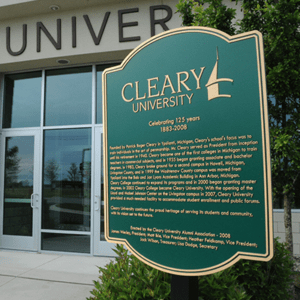Indirect measures capture students’ perceptions of their learning experiences, attitudes about the learning process, and opinions about their learning relative to the learning goals. Surveys are a good example of an indirect measure and are often used to gather information about student satisfaction levels, or to ask students how much they think they have learned. Indirect measures coupled with direct measures can often provide a more holistic and richer understanding of the learning experience, and how and what students are learning.
Academic program- or course- level examples of indirect measures include:
Course evaluation surveys are administered across campus and support instructors interested in students’ feedback about the course and their learning at the course-level. Learning outcomes from courses can be mapped to program and institutional learning outcomes.
The Ruffalo Noel Levitz standardized survey is taken by thousands of college students each year, allowing for benchmarking Cleary University data against national data from a cross-section of other private, 4-year institutions. Cleary administers this student satisfaction across multiple dimensions annually.
In alternate years, the Ruffalo Noel Levitz Adult Learner Inventory (ALI) is administered to non-traditional and graduate students.
The Satisfaction Inventory (SSI) is administered to traditional students.
The Student Support Services Survey is designed to collect information about students’ use and satisfaction with student support services.
The California Critical Thinking Skills Test (CCTST) measures the critical thinking and reasoning skills of Cleary undergraduate students as part of the assessment of the general education component of the curriculum. The assessment of this skill is essential to business students as the results serve as a predictor of how students analyze problems, evaluate alternatives, and anticipate consequences.
The Peregrine Business Administration Common Professional Components (CPC) Exam is a multiple-choice exam administered to all undergraduate and graduate students at the end of their academic program.
The SPOSS survey is administered each semester to students who are enrolled in PJT 4920: Professional Project II. The PJT 4920 class is a continuation of PJT 4910: Professional Project I and requires the student to complete a professional project that involves data analysis, evaluation of alternatives, and development of recommendations. The project is intended as a capstone project wherein students demonstrate mastery in writing as well as business acumen.
The SPOSS elicits feedback from the student in several areas, including a) personal development the student has experienced as a result of completing the PJT course sequence, and b) performance relative to learning outcomes related to the course, of which there is overlap with institutional outcomes.
Each year, a Graduate Career Survey is administered to students who are graduating within that academic year (Fall 2019 – Summer 2020). The survey is given to students in the BBAin BBA/MBA 9999 course. This is the final course that all graduating students are enrolled in. This allowsis allow for the collection of a high percentage of students’ informationstudents information.
The College Scorecardboard (https://collegescorecard.ed.gov) is a website maintained by the U.S. Department of Education that provides basic data on college performance metrics and also allows individual institutions or groups of institutions to be compared across a number of metrics. Searches can be conducted by type of program, location, total enrollment, name of institution, as well as by type of school, specialized mission, and religious affiliation.These metrics include: Average Annual Cost, Graduation Rate, Retention, and Salary after Attending. The metrics are predefinedpre-defined by the U.S. Department of Education to ensure consistency for comparison across institutions. Institutional metrics are generally updated every fall. These metrics are for undergraduate students only.
By providing a telephone number and submitting this form you are consenting to be contacted by SMS text message. Message & data rates may apply. You can reply STOP to opt-out of further messaging.
Cleary graduates use their business arts education to become the employees, entrepreneurs, and leaders who transform the marketplace…and the world.
Follow Us
HOWELL
DETROIT
Mon-Fri | 9am to 5pm
Sat-Sun | Closed
